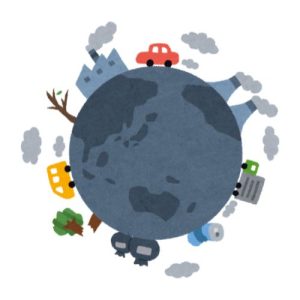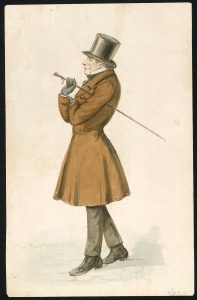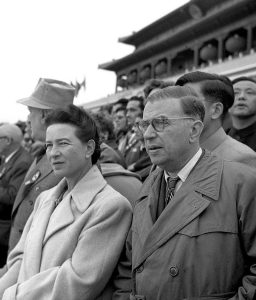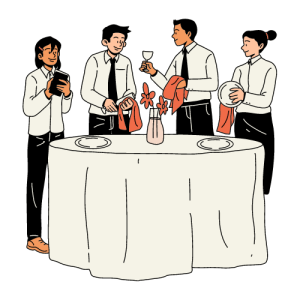11 Sartre’s Bad Faith
Manoesch Wouwenaar
Climate change raises existential questions about where personal freedom and responsibility lie. Many people feel alienated or powerless in the face of climate change, but Sartre’s concept of Bad Faith may offer a way to move beyond this anxiety.

Existentialists like Sartre argue that individuals are “condemned to be free,”[1] meaning we cannot escape responsibility for our actions, even when our problems seem impossible. Climate change compels us to confront the choices we make regarding energy consumption, lifestyle, and resource use. This creates tension between personal experiences and our shared responsibility for the planet’s future. Climate change goes beyond a simple “belief question” about whether climate change is true or not. Regardless of our stance, the reality remains: we must address the phenomenon, and ignoring it is certainly not a solution. So how can we address the phenomenon and understand how climate change impacts our experience of the world? That is where existentialism jumps in!
Existentialism in a nutshell

Existentialism is a philosophical movement that emphasizes individual freedom, choice, and subjective experience in a world often perceived as indifferent or absurd. Rooted in the belief that human existence precedes essence, existentialism reasons that individuals are not born with a predetermined purpose but must create their own meaning through their actions and decisions. This philosophy emerged in the 19th and 20th centuries, with influential figures such as Kierkegaard, Nietzsche, Sartre, and Heidegger contributing to its development.
At its core, existentialism grapples with questions of existence, freedom, and the human condition. It challenges traditional views of a fixed human nature, instead focusing on the idea that we determine our own purpose and meaning in life. Without inherent meaning or external authority dictating moral choices, individuals must confront the nothingness of existence and craft their own values and purpose.
Existentialism in contemporary uses has influenced comparative and environmental philosophy. Interpreting existence in a different way to substance ontology and metaphysical dualism provides room to look beyond those concepts and provides an opportunity to tackle our environmental crisis. From an existentialist’s point of view, we need to undergo an ontological transformation do that the environment (and the Earth) becomes part of our self-understanding.
SaRtre’s Bad Faith as a Philosophical tool

Jean-Paul Sartre (1905–1980) was a French philosopher, but also a playwright, novelist, and one of the leading figures in 20th-century existentialism. His work has had a lasting impact on philosophy, literature, and political thought, addressing the nature of human existence, freedom, and responsibility. Sartre’s existentialism focuses on the individual’s experience in an often chaotic, indifferent world, where traditional values and meanings no longer provide clear guidance.
Central to Sartre’s philosophy is the idea that “existence precedes essence.” This concept means that humans are not born with a predetermined purpose or nature. Instead, we define ourselves through our actions and choices. According to Sartre, individuals are radically free, but this freedom is both a privilege and a burden. It forces us to confront the weight of responsibility for shaping our own lives, as well as the world around us.
One of Sartre’s most influential ideas is the notion of Bad Faith (mauvaise foi).[2] He argued that people often deceive themselves by denying their own freedom and responsibility. Instead of embracing the anxiety and uncertainty that come with total freedom, individuals may hide behind societal roles, obligations, or false beliefs to avoid making difficult choices. This act of self-deception, Sartre believed, ultimately leads to inauthentic living.
To illustrate the concept, Sartre introduces the example of the waiter. For Sartre, this waiter is an example of someone acting in Bad Faith, a term he uses to describe the human tendency to evade the uncomfortable truth of our freedom by adopting false identities or living according to socially-prescribed roles. The waiter, in this case, is pretending that his entire existence is limited to the function of “being a waiter.” He goes through the motions as if his role defines his essence, thereby avoiding the deeper realization that he is fundamentally free to choose what kind of person he wants to be.

Sartre believes that Bad Faith occurs when individuals deny their own freedom by reducing themselves to fixed roles or labels. The waiter, for example, behaves as if being a waiter is his entire essence, when in reality, he is much more than that. He is a human being with the ability to make choices and redefine his identity beyond the confines of his job. Yet by throwing himself entirely into this role, the waiter seeks to escape the anxiety and responsibility that come with acknowledging his freedom.
The key problem with this kind of self-deception, according to Sartre, is that it leads to inauthentic living. By adopting roles or identities that are externally imposed or convenient, individuals can avoid facing the anxiety of freedom, but at the cost of living a life that is truly their own. In the case of the waiter, his performance reflects an effort to convince himself (and others) that he is a fixed, predetermined entity (merely a “waiter’) when in reality, he is always free to transcend that role.
Philosophical Exercise: Examining your own roles
- Part One: Identifying your roles
Begin by reflecting on the different roles in your life. Take a moment to list a few key roles you identify with on a daily basis. For example:
I am a student.
I am a manager at my workplace.
I am a friend.
I am a brother/sister.
Once you have your list, ask yourself: How do I typically behave when I am in these roles? What expectations (from myself or others) shape how I perform in these roles?
- Part Two: Investigating potential Bad Faith
Now, consider each role and reflect on whether you might be treating any of them as if they define your essence. Ask yourself:
1) Do I feel “stuck” in this role? Am I acting as though this is the only way I can be?
2) Am I playing this role in an exaggerated way? Am I performing it as if this is all I am, or could be?
3) Am I using this role as an escape? Do I lean on this role to avoid uncomfortable truths about myself or my life? For example: do I focus on my professional identity to avoid deeper personal questions about my life direction?
- Part Three: Reclaiming your freedom
Lastly, think about how you could embrace more freedom within each role. Sartre reminds us that we are never fully defined by any role. We always have the freedom to change and reflect on them. Ask yourself the following:
1) How can I approach this role more authentically? How can I take ownership of this role without limiting my broader sense of self?
2) What choices am I not acknowledging? Are there possibilities I am ignoring because they challenge the comfort of my current role?
4) What would it look like to redefine this role for myself? How can I reshape this role so it better aligns with who I want to be, rather than how I think I am supposed to act?
Bad faith and climate change
What does climate change have to do with Bad Faith? At first glance, it might seem like very little. Climate change concerns the warming of our planet and the changes in climate patterns driven by pollution and human activity. Bad Faith involves the tendency of individuals to hide behind social roles and expectations to avoid confronting their true freedom and responsibility.
However, climate change forces us to confront fundamental questions about freedom and meaning. If our planet, the only one we have, is in danger, where do we turn to? This existential threat creates a deep anxiety within society, leading people to react in different ways. Some recognize the problem and want to take action, hoping to steer humanity toward a more sustainable future. Others try to ignore or deny the issue, claiming it is either not real or that its impacts on humanity will be minimal.
From Sartre’s perspective, those who choose to ignore or deny climate change may be acting in Bad Faith. By avoiding responsibility, they fall into the role of the “ignorant bystander,” distancing themselves from the uncomfortable truth that their choices matter. For example, some might say, “What can I do if my role in society is too small to make a difference?” By questioning their power, they surrender their freedom and evade the anxiety that comes with accepting individual responsibility for an enormous global problem. In effect, they are choosing inaction over the discomfort of confronting their freedom to influence change.
The question remains: do people knowingly act in Bad Faith? Are they aware that they are hiding behind a societal role, denying their own freedom in the process? And if they are, do they understand why they do this? As discussed earlier, freedom can be both a burden and a privilege. Sometimes, the weight of responsibility that comes with true freedom is so overwhelming that we prefer to give it up, choosing comfort over the uncertainty that freedom entails.
bad faith and freedom
To illustrate how a preconceived role can diminish one’s freedom, let us have a look at the short story “The Freedom to Choose.”
Lyz sat at the cafe table, stirring her coffee as she chatted with Hana. It had been months since they’d last seen each other, and the conversation had drifted from work to family and then to the latest heatwave that had struck the city. The weather had been getting hotter each year, but this summer was the worst Lyz could remember.
“I’m telling you, this is crazy,” Hana said, shaking her head. “Just last week, I read about another massive wildfire. It’s only getting worse.”
Lyz shrugged. “I mean, it’s sad, sure, but it’s not like there’s much we can do. People blow it out of proportion, don’t you think? The Earth goes through natural cycles, after all.”
Hana paused, looking at her friend for a moment. “You really believe that?”
“Of course!” Lyz nodded, her chin rising a bit. “People talk about climate change like it’s some huge, looming catastrophe, but honestly, what can we do? We’re just ordinary citizens. Governments and big companies—those are the ones who could make a difference, not us.”
Hana leaned back, still looking at Lyz with curious eyes. “But don’t you think we’re part of the problem, too? I mean, we consume, we waste…”
Lyz laughed, shaking her head. “Hana, you’re such an idealist. Do you really believe it’s our individual choices that matter? I mean, maybe if every single person on the planet suddenly decided to live differently, but that’s impossible. Besides, I’m just one person. What I do does not matter.”
Hana’s face softened. “But maybe that’s exactly the point. You’re thinking about it in terms of what ‘everyone else’ should do, or what’s impossible for you alone. But what if our small actions do matter—maybe not in their immediate impact, but in how they shape our lives and align with what we value?”
Lyz hesitated, feeling a small flicker of doubt. She had always been so certain that she, as an individual, as part of a society, was practically irrelevant in the grand scheme of things. And yet, she couldn’t ignore the subtle shift she felt at Hana’s words.
Hana leaned forward, her voice calm. “I think, in a way, you’re avoiding the bigger question.”
“What question?” Lyz frowned, feeling slightly defensive.
“The question of your own freedom,” Hana replied. “You’re right, you’re only one person. But by telling yourself that your choices don’t matter, you’re choosing not to act. And by choosing not to act, aren’t you actually giving up some of your freedom? It’s almost like you’re using this idea of ‘being just one person’ as a way to avoid the responsibility of choice.”
Lyz stared into her coffee, Hana’s words sinking in deeper than she expected. She’d always seen herself as just a single piece in a vast, uncontrollable maze of people. But now, she wondered if she had been using that idea to escape the uncomfortable truth that she did, in fact, have a choice. That maybe, even in the smallest way, she was free to influence the world around her.
Through her conversation with her friend Hana, Lyz discovers a surprising truth about herself. As humans, we like to think of ourselves as free, yet we often avoid acknowledging our freedom because it brings discomfort and responsibility we would rather evade. Climate change is one such challenge, confronting us with the reality that we do not control everything. But even when things feel out of our control, we still have the power to make choices that shape how we handle the situation we are in.
Hana continued. “Think of it this way: If you believe your actions don’t matter, you don’t have to change anything. You get to stay comfortable, don’t you? No hard decisions, no need to confront your own impact on the world. But that’s also limiting, isn’t it? You’re restricting yourself to a role that says, ‘I’m powerless, so I’ll do nothing’.”
Lyz felt her cheeks grow warm. She had never thought about it that way. Could it be that, by clinging to the belief that she was “just one person,” she was actually trapping herself, giving up her freedom to make a difference, however small? She thought back to the countless times she’d avoided making changes that felt inconvenient or hard, hiding behind the thought that her role did not allow room for such choices.
“Hana,” she said slowly, “I think… I might have been avoiding responsibility. It’s easier to believe that nothing I do matters because then I don’t have to do anything uncomfortable. It’s like I’ve been letting myself off the hook.”
Lyz felt something shift inside her, a mixture of shame and newfound understanding. She’d always assumed freedom was something grand, out of reach. But now she saw it differently. Freedom was in the small, personal choices she made every day. It wasn’t about single-handedly saving the planet; it was about living in line with what she valued and taking responsibility, even when it felt uncomfortable.
“So, what do I do now?” she asked quietly.
Hana smiled softly. “That’s the beauty of freedom! You get to decide. But maybe start with small steps. Decide to make choices that align with what you want to see. Whether it’s reducing waste, being mindful of your consumption, or encouraging others to think differently. It doesn’t have to be everything all at once. Besides, even if you choose to focus on something different after the realization, then that is also part of your freedom.”
Lyz nodded, feeling a sense of purpose that was unexplored. For the first time, she felt like she could choose something, even if it was small. As she finished her coffee, she looked out the window, seeing the city with new eyes. Her actions might not solve everything, but they could still be her own—and that, she realized, was a freedom worth embracing.
An important takeaway from the story is that Lyz still has the choice not to change her behavior regarding climate change. What matters is that she realizes she truly does have a choice—and the freedom to act on it. Understanding this kind of freedom involves taking responsibility, so it would make sense that Lyz would start to feel a sense of duty to care for her home, the Earth. But this is up to the individual to decide.
Realizing that one has been acting in Bad Faith opens up the opportunity to reshape how one approaches certain situations. Sartre’s philosophical tool can shed light on the challenges we face in addressing climate change, offering insights that might otherwise go unnoticed.
Philosophical Exercise: Applying Sartre’s Bad Faith to Various Topics
Bad Faith challenges us to confront the ways in which we deceive ourselves to avoid acknowledging uncomfortable truths about our freedom and responsibility. This exercise invites you to apply this philosophical tool to various topics, enhancing your understanding of Bad Faith and its implications in different contexts.
- Step One: Choose a Topic
Select a topic that interests you or one that you feel is significant in today’s society. Here are some suggestions: Social Media, Digitalization, Migration, Workplace Dynamics, Gender, Educational Systems, and Consumerism.
- Step Two: Revisit the core elements of Bad Faith
Refresh your understanding of Bad Faith. What did Sartre mean by Bad Faith? How does it relate to Freedom, Choice, and an Authentic Life?
- Step Three: Analyze your topic with the concept of Bad Faith
Use the following topics and questions to guide you through the analyses. If it is not so clear, make sure to ask yourself the question of how people are related to this topic; what are their roles in it?
Identify instances of self-deception:
- How do individuals or groups deceive themselves in this context?
- What truths are being avoided or suppressed?
Assess the avoidance of freedom and responsibility:
- How do individuals shirk their freedom to make different choices?
- What responsibilities are they neglecting or passing onto others?
Reflect on consequences:
- What would be an alternative for the individuals if they move away from Bad Faith?
- What would this acceptance of freedom look like for the topic?
In confronting the realities of climate change, Sartre’s concept of Bad Faith provides a powerful lens for self-reflection. By recognizing our own freedom and the choices available to us, we can move beyond passive acceptance and begin to act with purpose, even in small ways. This philosophy challenges us to acknowledge our responsibility, inspiring a more authentic engagement with the world. Ultimately, embracing our freedom means not only facing discomfort but also finding meaning in our actions, empowering us to contribute to the care and future of our shared home, the Earth.
Want to read more about Sartre? Check out these blogs/articles!
- Sartre, Jean-Paul. Being and Nothingness : An Essay on Phenomenological Ontology. Translated by Hazel Estella Barnes. New York: Philosophical Library, 1956. ↵
- Sartre, Jean-Paul. Being and Nothingness : An Essay on Phenomenological Ontology. Translated by Hazel Estella Barnes. New York: Philosophical Library, 1956 ↵